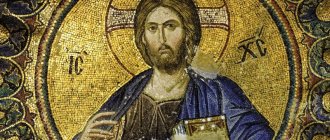website of the Gorlovka and Slavic diocese
The first steps on the path to becoming a church member can be difficult, because to new Christians much in the Church seems incomprehensible, alien, and even scary. Who should I contact with questions? How can I get the opportunity to communicate with a priest? How and how much to pray? Archpriest Andrei Baykov, clergyman of the Epiphany Cathedral in Gorlovka, tells what needs to be done so that churching leads to a deep and conscious life in the Church.
What questions should you ask yourself?
A person who wants to become a church member must first of all turn to the roots, to his past. It is important to know whether he is baptized and who his godparents are. Each of us bears the name of an Orthodox saint - our heavenly patron. He has his own story, a biography - we call his life. This life is a must read. As one becomes familiar with it, many spiritual and practical questions will certainly arise: is it possible to achieve such holiness? Isn't this a fairy tale? How are we connected to the invisible world of God and the saints? All these questions need to be asked to the clergyman during live communication with him.
Churching yourself using some textbook or book is difficult and sometimes even dangerous. The fact is that now there are many false religious movements that one way or another offer their teachings under the guise of ideas of goodness, peace and universal happiness. Before coming to the Church, a person usually has only the same idea of spiritual values. But often behind these beautiful words lie things that can cause serious spiritual harm. To avoid such mistakes, you need live communication with the priest.
Baptism itself is performed by three times immersion in the font.
The process of Baptism itself begins with the consecration of water. Before this, the priest dresses in white robes, which symbolize the new life brought to earth by Jesus Christ.
After the consecration of the water, the rite of consecration of the oil follows. To do this, the person being baptized is anointed with it: the forehead (forehead), chest, back between the shoulder blades, ears, arms and legs. This is done in order to sanctify the thoughts, desires and actions of the person entering into a covenant with God.
Baby baptism. After the Sacrament of Baptism, the person being baptized becomes clean and ready to receive the Sacrament of the Eucharist.
After the rite of anointing is completed, the baptismal baptismal prayer is immersed in the font three times, and the sacramental words are pronounced.
After a new member emerges from the font, he is clothed in white clothing. For men it is a baptismal shirt, for women it is a long shirt, like a nightgown, always with sleeves, or a baptismal gown.
Baptismal clothing must be new, pure white.
The priest puts a pectoral cross on the newly baptized person’s neck and says a special prayer.
Next comes the Sacrament of Confirmation.
After him, the priest and the convert walk around the font three times, which symbolizes eternity. After the solemn chants, the Epistle of the Apostles and the Gospel are read. At the end, the ceremony of cutting hair takes place, this is a sign of the Christian’s surrender to the will of God.
If we return to the question asked by Sabrina, we can say that Muslims are baptized in the same way as non-baptized ones. Currently there are no obstacles to this. Therefore, if she wants to learn better how to become a Christian, she can contact the nearest Orthodox church, where they will help her with this.
By leaving a comment, you accept the user agreement
How to “catch” a priest?
Now all the priests at the end of each service give announcements about what services will be performed in the church during the week. This ad is like a road map and you need to navigate it. In a church, you can ask any candle holder or person in vestments what time the Divine Liturgy (in the morning) or the evening service ends. If you approach the priest after the end of the service, it will be easier for him to find time to talk with you. It is especially convenient for conversation after evening service.
There is no need to be afraid of anything! Answering the questions of newcomers is the direct task of any clergyman. I can’t imagine anyone among them who would refuse attention to a person going to church.
Second phase
Photo: Flickr.com
Go to service. Prepare yourself for work, for long periods of standing, for the lack of understanding at first. If this is a Sunday liturgy, then read in advance what stages there are in it. Then each next stage will bring you closer to completion and will be understandable and meaningful. The service in this case flies by unnoticed.
What to read?
Many are afraid to directly address the clergy with their questions. To get rid of this fear, you can prepare a little theoretically. Take the books “The Basics of Orthodoxy”, “Spiritual Sowings” or “The Law of God” presented for family and school and read the initial theses about our faith. Who is Jesus Christ? Why did He come into the world? How does He distribute Himself in the form of Body and Blood during communion? These are fundamental questions. When a person is puzzled by them, he still has to turn to the priest and talk to him. It is necessary to find time for this. When a person comes with a book in which incomprehensible places are marked with a pencil, any priest will devote time to him and help him understand the most important thing: that the Head of the Church is Christ, He came to save humanity. That Confession, Communion and other sacraments that are performed in the Church are not scary. All of them are for us, and even he, a person who is not yet churched, can come, confess his sins and receive communion - if he is baptized, of course.
Another way to become a church member is to visit holy places, that is, places of special manifestation of God’s grace. However, I am more inclined to the first method, because worldly people do not always realize what the relics, icons and other shrines of the temples and monasteries they come to are.
Catechesis (Sunday school for adults)
When a person is looking for the possibility of becoming a church member, when, having been baptized in infancy, he realizes at some period of his conscious life the need for communication with God, the need to know the Truth, then he begins to look for the path to God, the path to the Church.
Very often on this path he encounters quite serious obstacles and temptations. And, sometimes it seems that a person could bypass most of these obstacles and more safely achieve a result if he had in front of him some kind of guide to action, “instructions” describing the steps, steps, after passing each of which, he will achieve the goal with minimal losses. And if such an instruction, such a recipe for churching is possible, maybe it’s worth forming it then?
Okay, let's try to create such an instruction, a universal list that can suit almost everyone. I would like to immediately make a reservation that the order that we are now drawing up is, unfortunately, not always observed in real life. All people are different, everyone has their own path to God, and each person begins this path with a different amount and knowledge, and experience. Therefore, it is quite difficult to propose some kind of universal scheme for churching.
A person can begin his journey in the Church with that step, which in our list will be the second, and the third, and even the sixth. The fact is that each step is taken in parallel with others, they complement each other and will be incomplete outside the general context. But since you and I have set ourselves the task of finding exactly the “ideal instructions”, a universal model, then, in my opinion, it will look something like this.
The very first thing, the first step for a person who decides to become a church member, should be familiarization with the Holy Scriptures. The Holy Scriptures contain the Old and New Testaments, and I would recommend starting your acquaintance with reading the New Testament. The Old Testament is quite difficult and not easy to understand. Having started reading the Bible from the Old Testament, a person can, so to speak, “get stuck” in it, get tired, tired of endless facts and changing events, and ultimately leave reading and thereby not reach the main thing - the New Testament. This is evidenced by the numerous negative experiences of those who began to independently read the Bible from the Old Testament. It would be better to read the Old Testament when there is an understanding of who Christ is. After studying the New Testament, the Old Testament will be clearer and more interesting to read.
Another point that a new believer should pay attention to is that it is better at this first stage to read the New Testament not in the Synodal translation, but in a retelling, with explanations, interpretations, maybe even with illustrations, so that the reading is not boring, but entertaining, interesting, in one breath.
A fairly good literary text of the New Testament is contained in the book The Law of God - this is a common book that can be bought in every temple. In addition to this, there are many other authors who interestingly present the events of the Gospel story. This is the “Gospel Story” by Theophan the Recluse, and Archpriest Pavel Matveysky, and many other authors.
Unfortunately, we sometimes have to observe the sad phenomenon when people seem to be already quite churched, regularly attend Sunday services, confess, receive communion, and yet they know very little of the Gospel history or have never read the New Testament in its entirety. Nowadays, many who consider themselves Orthodox do not even have a Bible at home, and sometimes they confuse it with a prayer book and think that the Bible is a collection of prayers. This attitude towards the study of the Holy Scriptures among the “Orthodox” is very sad, especially when you see how well various sectarians know the Bible, while in our country this essential, I would say, fundamental side of spiritual life remains neglected.
Why is it so important to read the Holy Scriptures? If a person decided to draw closer to God, wanted to give God a place in his life, he must clearly understand who Christ is. As the Apostle Paul says: “How can we call on Him in whom we have not believed? How can one believe in One whom one has never even heard of?” (Rom. 10:14). Therefore, how can we believe, go to services, pray, fulfill the commandments of that God about whom we don’t really know anything?
Each person, of course, has certain concepts about Christ, but often this knowledge is either distorted or incomplete. Even reading the New Testament itself can bring a person closer to God. I would like to give you the memories of our contemporary, Metropolitan Anthony of Sourozh, about the effect his acquaintance with the New Testament had on him.
When the future metropolitan was 14 years old, he lived with his parents in France. One day he heard a conversation about Christianity by a prominent theologian, and this is how the bishop himself describes his impression of it: “He spoke about Christ, about the Gospel, about Christianity..., bringing to our consciousness everything sweet that can be found in the Gospel, from which we would have flinched, and I flinched: meekness, humility, quietness - all the slavish qualities for which we are reproached, from Nietzsche onwards. He brought me into such a state that I decided... to go home, find out if we have the Gospel somewhere in our house, check and be done with it; It didn't even occur to me that I wouldn't end it because it was so obvious that he knew his stuff.
Mom turned out to have the Gospel, I locked myself in my corner, discovered that there were four Gospels, and if so, then one of them, of course, should be shorter than the others. And since I didn’t expect anything good from any of the four, I decided to read the shortest one. And then I was caught; Many times after this I discovered how cunning God is when He sets His nets to catch fish; because if I had read another Gospel, I would have had difficulties; There is some kind of cultural basis behind every Gospel. Mark wrote precisely for young savages like me - for the Roman youth. I didn’t know this - but God knew, and Mark knew, perhaps when he wrote shorter than others. And so I sat down to read; and here you may take my word for it, because you can’t prove it.
I was sitting, reading, and between the beginning of the first and the beginning of the third chapter of the Gospel of Mark, which I read slowly because the language was unusual, I suddenly felt that on the other side of the table, here, stood Christ. And this feeling was so striking that I had to stop, stop reading and look. I looked for a long time; I didn’t see anything, I didn’t hear anything, I didn’t feel anything with my senses. But even as I looked straight ahead at the place where there was no one, I had a vivid consciousness that Christ was undoubtedly standing there.
I remember that I then sat back and thought: if Christ is standing here alive, it means that this is the risen Christ; This means that I know for sure personally, within the limits of my personal, my own experience, that Christ has risen and, therefore, everything that is said about Him is true. This meeting determined my entire subsequent life, not its external events, but its content: as soon as I read the Gospel as a 14-year-old boy, I felt that there could be no other task in life than to share with others that life-transforming joy that had opened up. me in the knowledge of God and Christ."
You see what a revolution in the soul can be generated by reading the Holy Scriptures. One cannot remain indifferent to what the Lord says in the Gospel; while reading this amazing book, one cannot help but love Christ, not want to be with Him, to have fellowship with Him. This is where the desire to live according to His will is born, and the determination to fulfill His commandments appears. This is where it all begins, because without faith and love for Christ, all further steps will be meaningless. This, in my opinion, is the surest and best step from which one should begin one’s path within the fence of the Church.
The second step is prayer. You need to learn to pray. Here two aspects can be distinguished - home prayer and public prayer, which is performed in church during divine services. And they must go in parallel - you need to go to church for worship, and accustom yourself to pray at home.
You need to buy yourself a prayer book. This is often where the beginner encounters a difficulty. This is the Church Slavonic language of our worship and prayers. The easiest and fastest way to make this language more understandable for yourself is to acquire a small dictionary of Church Slavonic words. It is enough to remember the ten most frequently occurring words to make Church Slavonic texts understandable. Moreover, the Church Slavonic language is very similar to Russian. As a rule, the more often we pick up a prayer book, the deeper and clearer the texts of prayers become for us.
If we talk about the scope of the prayer rule, then from the very beginning you can set yourself a small rule. The main thing is to accustom yourself to pray attentively and not to get distracted by your thoughts. It is very important that this, even a small rule, be followed every day without any concessions to one’s busyness and laziness.
And if we take, for example, the prayer rule recommended by St. Seraphim of Sarov?
This is my attitude towards the rule of Seraphim of Sarov. It seems to me that it is not as simple as it seems at first glance. We often forget that Rev. Seraphim of Sarov said this rule to do three times a day, and not twice. And at the same time, mentally say the Jesus Prayer and “Most Holy Theotokos, save us.” And if we perform it only in the evening and in the morning, and thus shorten it, then this is no longer the rule that St. Seraphim gave.
Therefore, I would advise beginners to accustom themselves to reading morning and evening prayers. Maybe not completely, but read them. These are very ancient prayers, deep in content. Their authors are great saints, such as Macarius of Egypt, John Chrysostom, Basil the Great. And we must, as early as possible, introduce ourselves to the wealth of prayer that the Church possesses; from the very first steps we must not deprive ourselves of this true treasure.
Gradually, over time, maybe even months, you need to increase this rule to the best of your ability, remembering the advice of Theophan the Recluse: do not tie the rule to the number of prayers, it is better to allocate a certain amount of time for prayer and how much time I can manage during this time read with attention without haste, I’ll read as much as possible. And it is better to increase not the number of prayers, but the time devoted to the prayer rule.
You get up in the morning, you need to run to work, but you know for sure that you can devote seven to ten minutes to prayer without any fear of being late, so get up and read as many prayers as you can read in these ten minutes. When you do this constantly, the language of prayers will become more understandable and easier, prayers will begin to be memorized and prayer will become much easier. The main thing is to pray with attention and without distraction. This is the only prayer God hears. And all “reading” without attention, as St. says. Theophan the Recluse insults God, it’s like giving Christ a stale crust of bread.
With regard to church and conciliar prayer, you need to start at least small. You can remember the words of the Savior: “He who is faithful in a little will be set over much.” According to the commandment of God Himself, we must “work six days, and devote the seventh day to the Lord your God.” Sundays and also special holidays, of which there are not so many throughout the year, are mandatory for attendance at divine services.
And so, “starting small”, at first you can stand at the service not completely: half an hour, an hour. But this period of “peeping” into services should not drag on for long. For some, this lasts a lifetime and is generally what is called “going to church.”
If a person just limits himself to entering a church like this: they ordered notes, lit candles and what else to do here, it is unlikely that he will move along the road to churching. Public worship is social because everyone participates in it. There are no “spectators” implied here. And to be a full-fledged participant, you need to understand the meaning of what is happening, know the sequence of the service. Pointless service is unlikely to bring great results.
A Christian must pay significant attention to this aspect of his church life. Now there is appropriate literature that will help make the service understandable, and attending divine services interesting and deeply meaningful.
And here we move on to the third step, which is closely related to the previous one. When starting to attend church and services, you need to partake of the Sacraments of the Church. Anyone following the path of churching must choose a day for Communion. You need to start preparing for Communion gradually, and at the same time clearly understand that there are rules of preparation that must be followed.
Some people, unfortunately, do not know about these rules; they come to receive communion without an empty stomach, having had breakfast, without having fully served the Liturgy (I am generally silent about the fact that even on the eve of the day of communion one must be at the evening service) without knowing at all that how to prepare for this Great Sacrament.
Just recently a man was baptized, and he made me very happy that he prepared for Baptism in advance. He read a book about the Sacrament of Baptism, even had some understanding of the Creed, and knew that he himself must read the Creed at Baptism. And it’s very good when people take such important moments in life seriously.
You also need to prepare for Confession in advance; you need to prepare at home, and not while waiting for your turn in front of the lectern. You need to think: “What sins do I have? What should I repent of?” Difficulties arise when we do not see our sins or forget them, and sometimes it seems that there are no sins and there is nothing to say - in this case, I recommend turning to the relevant literature.
We have a widely distributed brochure, “To Help the Penitent,” and we have a book by Ioann Krestyankin, “The Experience of Constructing Confession.” All these books contain mainly a list of sins that are most common among all people. Using this list you need to check your conscience - you will definitely find something in relation to yourself.
If you are afraid that when you approach confession and are confused, you will forget everything you would like to say, then you can write out your sins on a piece of paper in advance, and on this piece of paper, with such a cheat sheet, peeking or reading the written sins from it, confess.
Sometimes you can come across such a judgment that this practice of writing down sins on paper and reading from this sheet is not correct. And churchgoers often recommend that newcomers not do this. How correct is this reasoning?
To be honest, I have not heard such a judgment among people. Well, to each his own, whoever feels better will confess that way. At this point, there is, of course, another extreme, when such a piece of paper, covered with writing, is thrust into the priest’s hand: “Father, read it.” The priest reads it and that’s it - the confession is over. There is no need to tell the person himself anything. This can be observed in some churches, but it seems to me that this is not an entirely healthy phenomenon in our church practice.
Confession itself implies a verbal revelation of sins to the priest. After all, it is not for nothing that in the prayer that is read by the priest before confession, there are such words, “You Himself, as the Good and Benevolent Lord, have been pleased to resolve these servants of Yours.” What does it mean? This means that everything that these people say in words, You, Lord, resolve and forgive these sins. Therefore, the piece of paper is only a help and a hint. It happens that people know their sins so much that they don’t need any cheat sheet, these sins are always before their eyes, and their conscience constantly reminds them.
There is another good practice, which is most often used by people who are already more churchgoers, who confess regularly, and in the interval from Confession to Confession, a person writes down the sins committed and does this not the day before, but during this entire period of time. If you remember something, write it down, if you see some flaw in yourself that you hadn’t noticed before, write it down before you forget, and the paper will preserve what you wrote down until Confession.
Are there any sins of a person that he must, without hesitation, tell at his first confession?
Confession is a sacrament at which all confessed sins are forgiven. Therefore, you need to take advantage of this opportunity and talk about everything that is, and not divide into what is paramount and unimportant, what to tell today and what to tell tomorrow. This may even be a profanation of confession - what kind of repentance is this, incomplete, fragmentary?
But there are times when a person is not ready to immediately tell something at the first confession. Such a person may reason: “I won’t tell you yet, but I’ll tell you when I’m ready for it.”
This approach, of course, is not correct. In the Sacrament of Confession, not only are sins forgiven, but the Lord also heals our infirmities with His Grace so that we do not repeat these sins. Sometimes it happens that, going to confession, a person thinks: “I will, of course, confess this sin, but I know for sure that I will commit it anyway.”
And here it is necessary to give place to the action of God, so that the Lord will help man. A person did not approach confession with the firm intention of leaving sin, he thought that he would continue to commit the confessed sin, but after confession the Grace of God touched the heart and a determination appeared after all not to commit the confessed sin, and the soul itself began to speak differently. Then he himself will sometimes be surprised - there seemed to be no readiness, but now it has appeared, it has become easier, the Lord has given through the Sacrament greater strength to fight sin.
Repentance is not only human, it is also a Divine action, an action of Divine grace. Because only God can free us from our sins. Desire and work are required on our part, and liberation of a person from passions is a task only within the power of God. Therefore, we need to give God the opportunity to intervene in our lives and change something in it.
Only in the Sacraments of the Church can we receive this healing Divine grace, and therefore we must approach them as often as possible, for outside the Sacraments there can be no Christian life.
Another side of churching is closely connected with the Sacraments of Confession and Communion. Let's call it the fourth stage. Over time, you need to find yourself a spiritual leader, a mentor who, with his wise advice and prayer, will guide you through the church field. Maybe you won’t find such a priest right away, and maybe not even in the first years of your church life. Here you need to search the way a bride is chosen. Take a closer look, chat, don’t rush after the first one you come across. God grant that he be a man of great conscience, spiritually sober and prudent.
In addition, by visiting a temple, a person gains friends and acquaintances, through whom they also join the Church. This is an important moment - to join the church environment, so that here too you can find your brothers who can be of help, who can advise and help. After all, some issues that especially relate to small things, for example, church etiquette, can be resolved by asking advice from a more experienced parishioner.
The next, fifth step is attending Sunday school for adults. If there is such a school at the temple or classes are held with a priest, then you should definitely take this opportunity and sign up for these courses, go and listen. Even in small and village churches, priests find time to organize such a school at the church. This is also an important step in churching.
The sixth stage can be noted as pilgrimage trips. On a pilgrimage trip, a person communicates in a church environment, with believers, touches live some pages of church history, and through this he learns a lot. By prayerfully visiting monasteries and monasteries where the saints labored, he acquires new prayer books and heavenly patrons. Many aspects of church life are revealed in a new way on such trips. Pilgrimages to holy places give new strength and impressions.
Another of the most important steps is initiation into reading. It is very difficult to lead church life without reading church literature. Even if a child grows up in a believing family, but with age he does not acquire new knowledge, without reading or being interested in anything, then there is a danger that, upon entering adulthood, he will simply leave the Church, because his childhood faith, based on reading in his distant childhood, a children's Bible, will not be able to answer the adult questions that arise. Therefore you need to read. Read according to age and interests. There is an abundance of literature in our time. For every taste, as they say. If you are interested in learning about the history of the Church, please do so. If you are more interested in theology, there is a huge choice here. If you like stories about ascetics of piety, read the lives of the saints.
I would advise a beginner to read, as I already said, first of all, the Law of God, the interpretation of the Gospel, the lives of saints, so that the examples of holy ascetics inspire them to Christian life, and help them stay in the church environment. And gradually we must introduce ourselves to the works of the patrists, first, perhaps, to the books of modern fathers, then going further and further into the centuries, turning to the works of earlier ascetics. It is more expedient to gradually combine all this with churching - it will be difficult for a person with little church to read the serious patristic works, because the questions that are raised in them will simply be difficult to understand and uninteresting to them. You need to captivate yourself and interest yourself in reading. And then move on to serious literature.
What kind of serious literature is this?
I mean, of course, patristic literature. It’s bad if our home library contains only “The Law of God” and “First Steps in an Orthodox Church.” We must gradually introduce ourselves to the rich patristic heritage of the Church. The works of such ascetics as Theophan the Recluse, Ignatius Brianchaninov, and Abba Dorotheus should be reference books. Find out from priests and friends what book would be useful and interesting to read. Our church also has a library - you can come and consult.
In addition to books, there is a huge selection of audio material on the Internet. Lots of lectures and conversations. I would advise beginners to listen to some recordings of lectures by Alexey Ilyich Osipov, professor of the Moscow Theological Academy. I would highly recommend listening to his lecture entitled “The Essence of Christianity” in the first edition of his audio CDs. All this is quite accessible on the Internet.
Father, I have another question: when a person becomes a church member, at first it sometimes becomes very difficult for all his relatives. A special period begins - when unbridled agitation begins, born, of course, from the most sincere emotional manifestations. How can one take care of oneself so as not to cause harm to others with such a state, and not push them away from Orthodoxy?
In our country, even the very word “neophyte” is firmly associated with unbridled preaching to everyone and everything, imposing one’s churchliness and religiosity. This, of course, is also a big mistake that needs to be avoided, but at the same time not to go to the other extreme - to be embarrassed to cross yourself, to be afraid of what they will say about you, to take these opinions into account too much. Everyone has to go through this, face the fact that those around them begin to point fingers, reproach, laugh, and try to hurt. This happens to many people, you need to overcome it and endure it.
There is also no need to immediately force all of our households to immediately strive for the churchliness that has appeared among us. It’s impossible to force, but you can slowly introduce, introduce. Often parents are sad that their children do not go to church and know nothing about faith. When you ask at what age they themselves came to the temple, they say that they themselves came at a far advanced age, and there was a time when they also did not believe and lived the way their children live now. This must be understood - everyone has their own time even to come to God. Do not impose your churchliness with such insistence as to arouse in a person disgust or even hatred for every word about God.
You need to act wisely. For example, a mother drags her daughter to church and repeats this to her every day, and her daughter will soon develop an allergy from such a sermon. Why do this? Isn’t it more correct to choose the right moments when a person is ready to perceive. For example, some joy happened - to tell my daughter: “Go to church, light a candle, thank God.” And maybe she will go. Some kind of grief happened - “Go to confession, take communion - the Lord will manage everything.” At certain points in life, you can approach a person with this topic, but you need wise reasoning about when it is best to do this.
Also, you don’t need to think that I converted, started going to church, which means that everyone else is now worse than me, and I am higher than others. You also need to take into account the infirmities of your family. Much depends on what position the believer occupies in the family. If this is a schoolchild, then he cannot, for example, order the whole family to fast. He eats what his mother cooks for him. Of course, if mom meets halfway and agrees to cook him lean food, that will be good. But if mom doesn’t agree to this, fasting is accompanied by scandals and constant troubles, then you have to be patient and eat what mom cooks, and fast to the extent that you can. Refuse, for example, from watching TV, from some products that he himself can refuse without problems. And such a fast will be more useful and pleasing to God than one that is accompanied by quarrels and mutual alienation.
Father, could these seven steps or steps you have outlined have any fundamental differences for people of different age groups? Or is this still a universal “instruction”?
I think this is a fairly universal list of steps that will work for most. It happens, of course - and most often - a person begins his churching not with reading the Holy Scriptures, not with studying the New Testament, but with Communion or meeting believers. The scheme I have proposed is the most convenient from my point of view; it will make a person’s path to church membership more natural. Although churching can also begin with a pilgrimage - if a person finds himself somewhere on a trip with Orthodox Christians, he enters a church, looks at the way of life of the monastery, he becomes interested, and has a desire to read something. Sometimes churching can begin with some other book - not with the New Testament, and the remaining steps will come later. Any of these steps can be the first - reading literature or attending Sunday school.
Concluding our conversation about churching, I would like to talk about one misconception that often reigns in the minds of our compatriots. They say something like this: “What does the Church have to do with it? I have my own personal relationship with God. Where did they get the idea that only in the Church and through the Church can one be saved? No! Churching is not my topic.” I will not polemicize on this topic in the context of our conversation now. I will only quote the words of the saints of the first centuries.
“We should not seek the truth from others,” says Saint Irenaeus of Lyons (2nd century), “it is easy to borrow from the Church, for in it, as in a rich treasury, the Apostles put everything that belongs to the truth. Where the Church is, there is the Spirit of God, there is all grace.”
Hieromartyr Cyprian of Carthage (III century): “Whoever does not listen to the Church is not a son of the Church, and to whom the Church is not a mother, God is not his father.”
Blessed Augustine (IV century) says: “Only he is saved who has Christ as his head, and only he who is in His body, which is the Church, has Christ as his head.”
It is important to understand that Christianity is not just a moral religion that teaches a person exclusively goodness and a virtuous life. Christianity is, first of all, life, which is possible only within the Church, within a single church spiritual organism, through participation in the Sacraments, participation in divine services - only through this can a person join God and become an heir to His Heavenly Kingdom.
— Service “Elitsy.Notes”: Order prayers for all everyday and spiritual needs to the venerable Orthodox Shrines of Russia and the world: zapiski.elitsy.ru/special/ozdravii?partner=elitsyweb
How and how much to pray?
Sometimes unchurched people decide that they can determine a prayer rule for themselves, but there is a danger, on the one hand, of not praying at all, and on the other hand, of imposing unbearable burdens on themselves. To determine the size of the rule, you must first contact the clergy. He will recommend prayers that are not only filled with meaning, but also inspired by God - the morning and evening rules begin with these. They provide not so much information as spiritual strength.
Just as we offer milk first to an infant and then solid food, so to a newborn—a spiritual infant—we need to offer prayers that are unconditionally assimilated by the soul. Only after a while can one move on to the long canons and following Communion: when he already understands that prayer is direct communication with God, the Mother of God and the saints.
The Zion Upper Room is considered the first Christian temple
The Upper Room of Zion or the Upper Room of the Last Supper is recognized as the right Christian temple in the world. This is a room located on the top floor of one of the houses in Jerusalem.
The Last Supper was celebrated here, that is, the last Easter meal of Jesus Christ with his disciples. In addition, some other important events from the New Testament took place here, for example, the Descent of the Holy Spirit on the disciples on the day of Pentecost (Acts 2:1-4).
Zion Upper Room. The Last Supper was celebrated on the second floor of this building. That is why it is considered the first Christian temple
The first Christian church in the world today does not belong to any denomination. It is in the possession of the Israeli government. Entrance here is free and free, but praying in a loud voice is prohibited here.
Tradition points to the building of the Zion Upper Room, located on the top of Mount Zion. It stands outside the walls of the Old City, not far from the Zion Gate.
The modern room of the upper room was built in the Gothic style in the 14th century by a Franciscan monk. On the first floor of the building there is a synagogue with the tomb of King David.
Should I participate in the sacraments?
We must try to encourage ourselves to confess and partake of the Holy Mysteries of Christ, because this miraculously gives spiritual strength. Then the person will really begin to become a church member, and this will be visible to both himself and the priest. It’s no longer scary to go to confession, venerate icons, ask for help from the Mother of God, and take a blessing. He will begin to live not only by physical concepts and standards, the world will expand for him. A churched person becomes necessary not only at work and in the family, but also to members of the Orthodox family, the Head of which is Christ.
Internal churching must always be continued. We must strive all the time to consider ourselves insufficiently enlightened, not sufficiently understanding God. If a person finds time in his life and shows a sincere desire to understand what the Church is and who Christ is, then the Lord will always reveal Himself to him.
Recorded by Ekaterina Shcherbakova
You can become a Muslim by sincerely reciting the creed or shahada (testimony)
Islam is another world religion along with Christianity. Muslims profess that “there is no god but Allah, and Muhammad is the prophet of Allah.”
Christian theologians point out that Allah cannot be considered the same One God as in Christianity, since Muslim ideas about God contradict Divine Revelation.
Unlike the Christian Revelation, Islam does not teach that God is Love, incarnate for the sake of saving people, but presents Allah only as a judge, rewarding and punishing for deeds, predetermining human destiny.
“Muhammad is the Messenger of God” - inscription on the gate of the “Prophet’s Mosque in Medina”. Muslims say: “There is no god but Allah, and Muhammad is the prophet of Allah.”
The God-man Jesus Christ is accepted in Islam as one of the prophets for his people and his time, but His Divinity and the reality of the Incarnation are denied.
Muslims believe that before suffering on the cross, Christ miraculously replaced Himself with another person, and He Himself was taken to Heaven alive. That is why in Islam there is no such concept as the Sacrament of Communion.
2 Muslims
needed to pronounce Islamic testimony
To accept Islam, it is enough to recite the text of the Shahada - Islamic testimony.
In this regard, baptism in Islam is fundamentally different from baptism in Christianity and has nothing in common with it.
It is a common belief among Muslims that everyone is a Muslim by birth, as descended from Adam, but sometimes a person needs additional steps to “return” to the true faith.
Usually, in order to accept Islam, it is enough to recite the text of the Islamic testimony - the Shahada in the presence of two Muslims.
Calligraphic inscription of Shahada. By reciting the Shahada formula a person becomes a Muslim
Before doing this, you must renounce all beliefs that contradict the true religion of the Almighty. The words of the Shahada are pronounced with faith in the heart and a firm intention to accept Islam.
The formula of Islamic Witness - Shahada in Arabic is as follows:
“Ashhadu alla ilahaillallah wa ashhadu anna Muhammadan rasulullah.”
Muslim Church: 3 main mosques
Approximate translation into Russian:
“I know, believe with all my heart and confirm in words that there is no deity except the One Creator - Allah, and I know, believe with all my heart and confirm in words that Muhammad is the last Messenger of Allah.”
After reciting the Shahada, a person becomes a Muslim, and he must perform all the duties prescribed by the Almighty Creator.










